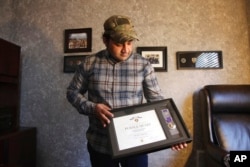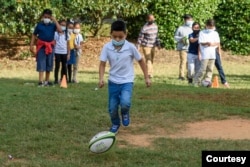CHARLOTTE, NORTH CAROLINA —
Among the thousands of Afghans evacuated to the United States in recent months, several hundred are being relocated to the southeastern state of North Carolina, where preparations are in full swing to help them adjust to new lives in America.
Time is of the essence, according to Marsha Hirsch, executive director of the Carolina Refugee Resettlement Agency (CRRA), based in Charlotte, North Carolina’s largest city.
“It’s always our hope that after the 90 days, someone [a refugee] is employed, so that the case can move forward to financial self-sufficiency, paying their own rent, taking ESL [English as a Second Language] classes, enrolling the children in school,” Hirsch told VOA. “So, we try to accomplish all of those tasks in 90 days.”
Like many refugees, the relocated Afghans fled war and upheaval as the Taliban swiftly came to power in the final days of the U.S. military withdrawal from the country. Unlike most refugees, nearly all Afghan evacuees already had some connection to the United States, having been on U.S. payrolls during America’s 20-year war in Afghanistan or related to someone who was.
“Almost everybody [who] was given this visa [to come to America] had to work with the United States in some capacity, of course with their relatives,” said Omer Omer, director of the U.S. Committee for Refugees and Immigrants’ Raleigh, North Carolina field office.
Omer noted that some Afghan evacuees have already arrived in North Carolina, with more to come from U.S. military bases where they have been temporarily housed. Some arrive as family units, others as individuals.
“I expect we’ll start to get larger numbers,” he said. “So, we are really bracing ourselves.”
Adjusting to American life
Helping Afghans reestablish themselves in the United States requires a holistic approach that begins with a basic need – being able to support themselves and their families.
“We have a full employment program, and we are very big about this one,” Omer said. “We work intensively, analyzing these people [arriving refugees] and finding their potential. First, we want to make sure that they work and pay for their bills, but after that, we come to the next evaluation and in this phase, we allow them to make use of the skills, like gaining a certification for a mid-level technical job or taking extra courses.”
Some challenges Americans are all too familiar with are also stumbling blocks for Afghan evacuees, including housing.
“We are facing housing issues, not affordable housing – housing period. There is no housing!” Omer told VOA. “It is our responsibility to do a good job as a community and prepare them. So in the meantime, finding the capacity of space is one of our biggest challenges.”
In Charlotte, CRRA is networking with local institutions, including community colleges and companies based in the city.
“We have relationships with lots of employers where refugees whom we have welcomed find jobs to become self-sufficient. Relatedly, while we don’t offer ESL programs, we partner with the local community college to offer refugees English language lessons,” Hirsch said. “The college also offers a wide variety of programming for gaining certifications in other sectors and ultimately forging career paths for refugees.”
Community response
Afghans have arrived at a time of contentious debate regarding U.S.-bound immigration. A majority of North Carolinian voters twice opted for former President Donald Trump, who dramatically cut the number of refugees admitted to the United States.
But Hirsch sees a welcoming environment for Afghans arriving in the state.
“I would have to say from our office’s point of view, it hasn’t been our experience that people have been hostile to this process [accepting and resettling Afghan refugees],” she said. On the contrary, she praised “the outpouring of support that has inundated the office, from calls to emails, and people even stopping by with donations.”
While expressing concerns about uncontrolled migration to America’s southern border, Charlotte resident Karina Gauthier is among those who want to put out the welcome mat for Afghan evacuees, all of whom came to the United States legally.
A mother of two adult children, Gauthier has lived in the Charlotte area for many years and works for a local nonprofit organization.
“In general, I welcome new migrants into the Charlotte area, I believe they make our city more interesting and richer in culture. I’ve recently been thinking about volunteering helping them [Afghans] to adjust, but I have so little time right now,” Gauthier told VOA.

